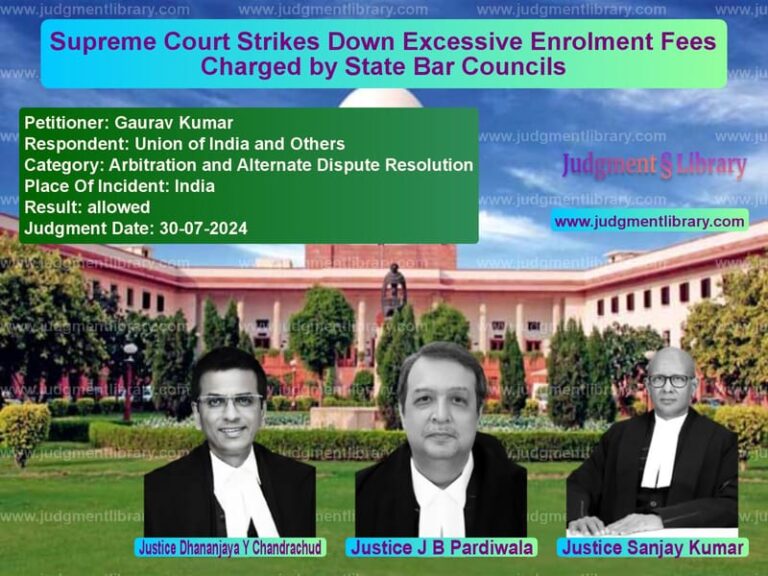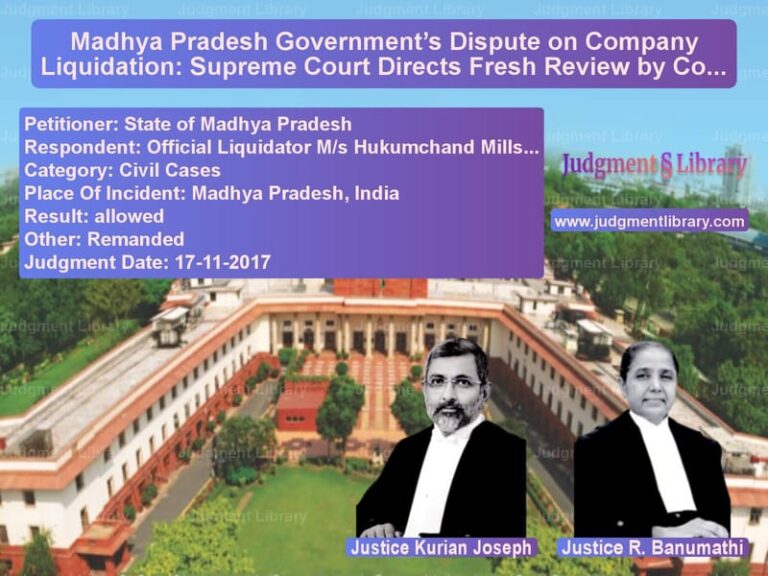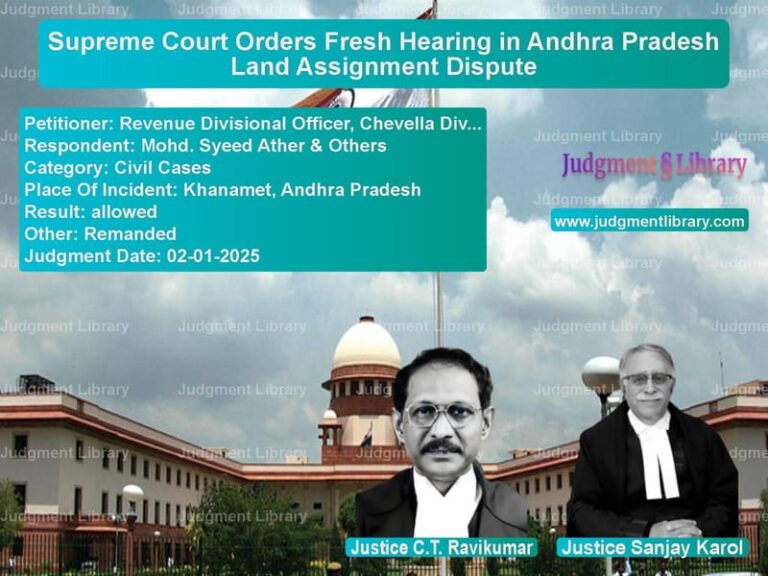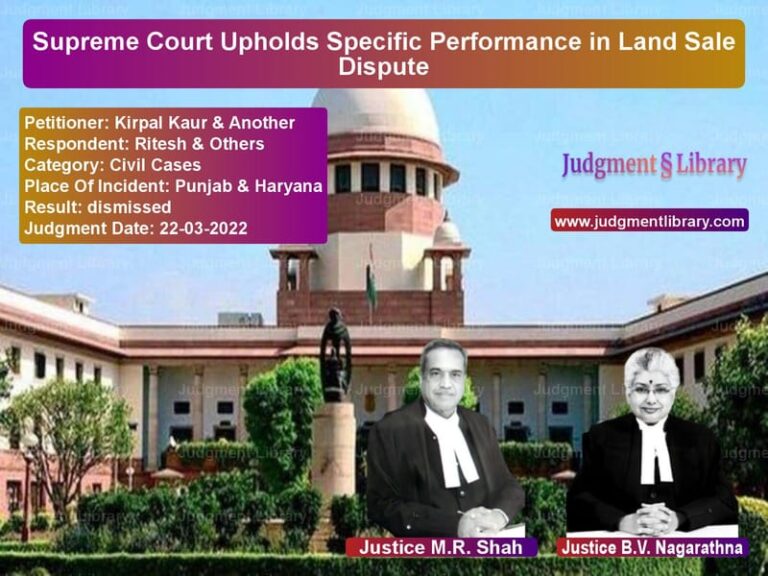Supreme Court Quashes High Court’s Order for Enquiry into Audio Transcript in PIL
The Supreme Court of India delivered a judgment in Devendra Kumar Saxena v. Union of India & Ors., which dealt with the issue of maintaining public interest litigation (PIL) and the proper procedure for introducing evidence. The case arose from a writ petition filed by a society under the leadership of retired Justice V. Eswaraiah, who challenged the conduct of officials in Andhra Pradesh during the Covid-19 pandemic.
Background of the Case
The Public Interest Litigation (PIL) filed by the BC SC ST Minority Student Federation sought to address the failure of the state government and the High Court in effectively managing the pandemic. The PIL prayed for several reliefs, including the implementation of Covid-19 guidelines, the designation of specific areas as containment zones, and a central enquiry into the untimely death of a High Court employee during the pandemic. The writ petition also sought to investigate alleged failures in controlling the spread of the virus in government offices.
The High Court of Andhra Pradesh had passed an order in August 2020, directing an enquiry into the authenticity of an audio conversation related to the petitioner’s allegations. The conversation was contained in a pen drive, and the High Court appointed a retired judge, Justice R.V. Raveendran, to conduct an enquiry into its authenticity. This was despite the petitioner’s admission to the conversation’s authenticity.
Retired Justice V. Eswaraiah filed a special leave petition (SLP) against this order, challenging the High Court’s decision to order an enquiry into the conversation. The petitioner argued that the High Court’s decision to proceed with the enquiry was unjustified, given that the conversation had already been admitted and no further investigation was necessary.
Petitioner’s Arguments (Retired Justice V. Eswaraiah)
- The petitioner argued that the High Court should not have initiated an enquiry into the authenticity of the conversation, as the conversation had already been admitted in the affidavit filed by the petitioner.
- The petitioner contended that the High Court’s order directing an enquiry was unnecessary and had caused unnecessary delay in addressing the original PIL.
- Eswaraiah also argued that the enquiry was not relevant to the core issues in the PIL, which concerned public health measures during the pandemic and the actions of the state and judiciary.
- He emphasized that the High Court’s order, especially its direction for an enquiry into the pen drive contents, was a misuse of judicial power, as the conversation was already submitted with the correct transcript.
Respondent’s Arguments (BC SC ST Minority Student Federation)
- The respondents, representing the society filing the PIL, argued that the High Court’s decision to direct an enquiry into the transcript was valid, as the authenticity of the conversation had to be independently verified before it could be used in the proceedings.
- The respondents argued that the petitioner’s health-related claims and the contents of the conversation needed to be investigated thoroughly to ensure that the judicial process remained transparent and based on facts.
- The respondents further submitted that the enquiry would not only address the authenticity of the conversation but would also shed light on possible third-party involvement in manipulating the contents.
Supreme Court’s Analysis and Judgment
The Supreme Court carefully examined the issue of whether the High Court’s order for an enquiry was justified. The Court made the following key observations:
- “The authenticity of the transcript had already been admitted by the petitioner, and there was no need for further enquiry into its validity.”
- “The High Court’s direction for an enquiry by a retired judge was unnecessary as the matter could be decided based on the petitioner’s admission and the documents already submitted in the case.”
- “The object and purpose of the PIL was not related to the authenticity of the conversation, but rather to public health concerns and administrative failures during the pandemic. Therefore, the enquiry directed by the High Court was outside the scope of the original petition.”
- “Even though the petitioner had provided the conversation and transcript, the High Court should have focused on the maintainability of the PIL and not allowed an enquiry to divert attention from the primary issues at hand.”
In light of these findings, the Supreme Court ruled that the High Court’s order directing an enquiry into the conversation’s authenticity should not have been issued. The Court held that the matter should be addressed directly by the High Court without further delay, and the enquiry by Justice Raveendran was not necessary. The judgment reinforced the principle that judicial processes should be used efficiently and should not be prolonged unnecessarily.
Key Legal Principles Reinforced by the Judgment
- Efficiency of Judicial Processes: The judgment emphasized the need for courts to avoid unnecessary delay and focus on the core issues of the case, especially when the authenticity of evidence has been admitted.
- Use of Enquiry in Legal Proceedings: The ruling clarified that an enquiry should only be conducted when there is a genuine need for it, not as a procedural delay tactic.
- Transparency and Accountability: The case reinforced that transparency in judicial processes is essential, and any investigation or enquiry should serve the greater goal of justice, not complicate the matter.
Impact of the Judgment
The ruling sets a significant precedent for PILs in India, particularly those that involve allegations of misconduct or corruption. It clarifies that while accusations should be thoroughly investigated, unnecessary delays or distractions, such as unnecessary enquiries into admitted evidence, should not be allowed to hinder the legal process.
Additionally, the judgment highlights the role of the judiciary in ensuring that PILs are filed in the public interest and not for personal or political gain. The Court’s decision to quash the High Court’s order on enquiry underlines the importance of fair and timely proceedings, especially when the health and wellbeing of citizens are at stake.
Conclusion
The Supreme Court’s decision in Devendra Kumar Saxena v. Union of India reinforces several key principles of judicial efficiency, transparency, and accountability. By quashing the High Court’s order for an enquiry, the Court has ensured that the legal process remains focused on the substantive issues in the PIL. This judgment provides clarity on the limits of judicial power in conducting enquiries and serves as a reminder of the need for timely and focused legal proceedings in the public interest.
Petitioner Name: Devendra Kumar Saxena.Respondent Name: Union of India & Ors..Judgment By: Justice Ashok Bhushan, Justice R. Subhash Reddy.Place Of Incident: Andhra Pradesh.Judgment Date: 12-04-2021.
Don’t miss out on the full details! Download the complete judgment in PDF format below and gain valuable insights instantly!
Download Judgment: devendra-kumar-saxen-vs-union-of-india-&-ors-supreme-court-of-india-judgment-dated-12-04-2021.pdf
Directly Download Judgment: Directly download this Judgment
See all petitions in Public Interest Litigation
See all petitions in Separation of Powers
See all petitions in Emergency Provisions
See all petitions in Judgment by Ashok Bhushan
See all petitions in Judgment by R. Subhash Reddy
See all petitions in dismissed
See all petitions in supreme court of India judgments April 2021
See all petitions in 2021 judgments
See all posts in Constitutional Cases Category
See all allowed petitions in Constitutional Cases Category
See all Dismissed petitions in Constitutional Cases Category
See all partially allowed petitions in Constitutional Cases Category







